If you’re bringing a Poodle into your home, it’s important to prepare your space for them just like you would for a new baby. This means making sure your home is safe and getting all the necessary supplies like dog beds, toys, dishes, and more.
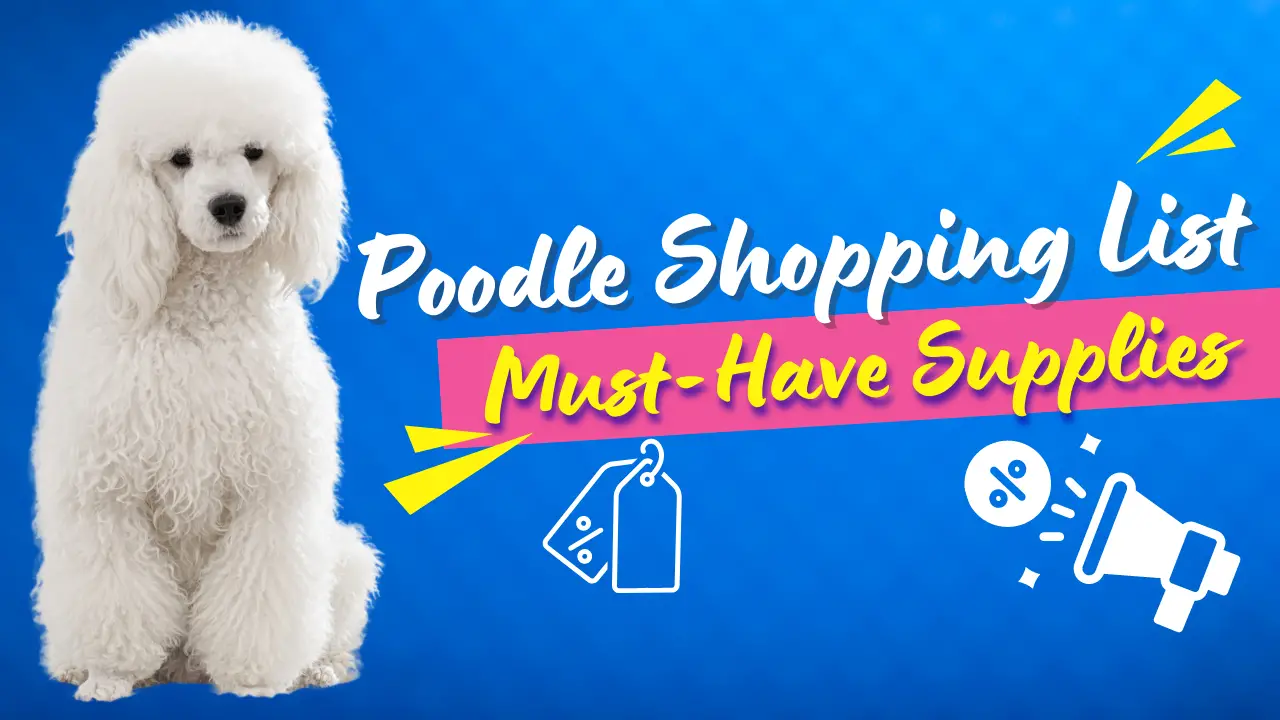
As an Amazon Associate, I earn from qualifying purchases.
You can easily find everything you need at a pet store or online, but you can also check out supermarkets and discount stores for some items. Don’t forget to also look for collars, leads, and toys for your new pupp.

Read our Smart Poodles - Smart Tricks eBook for only $2.99
Dive into a treasure trove of engaging tricks and tips designed specifically for your poodle!
What Will You Learn? 👇
Crates
When bringing a Poodle home for the first time, you must get the appropriate size crate so that they can easily integrate into your family. The type and size of crate can differ based on whether you bring a Toy, Miniature, or Standard home.
However, if you don’t want to worry about your Poodle’s growth, you should get a crate with maximum functionality. It’s often recommended you get a 42-inch crate that gives them ample room to stretch out their legs but not too big to trigger anxiety.
Note: This size is just a suggestion; you should always aim to buy a crate that is big enough to fit the full adult size of your Poodle. Not only is this a practical decision but a cost-effective one too!
To put it into perspective, here are the fully grown sizes of the Toy, Miniature, and Standard:
| Type | Height |
| Toy | 24-28cm/10-12 inches |
| Miniature | 39cm/15 inches or under |
| Standard | 40-61cm/16-24 inches |
To better understand what crate is right for your Poodle, you should speak to your local kennel club or pet store. They will be able to advise you accordingly in preparation for your Poodle puppy’s homecoming.
The Benefits Of Crates To Owners
If you’re a new dog owner, getting a crate for your Poodle may sound like a cruel concept, but it’s not. Often there are a lot of negative stigmas attached to them, making crates sound like a punishment for Poodles. However, if used correctly, they can actually be highly beneficial for training your Poodle; they provide the following benefits for owners:
Eases up transportation
Upon bringing your puppy home, you’ll have a lot of appointments to attend. If you’re lucky, your vet might come to your house for vaccinations; at other times, you’ll need to take it to them. A crate can save you the headache of travel by placing them in your car or on public transport without them getting scared or moving.
Note: If you need to take them outside your house, you should make their crate comfortable with toys and blankets before travel.
Speeds up house training
When it comes to potty training and house training, a crate can help your puppy learn behaviors easily. If used effectively, you can establish a regular routine and teach them when to potty.
Reduces separation anxiety
Keeping your Poodle in a crate can serve multiple benefits when you’re not around. If you’re away from your home, a crate can keep your puppy calm and stop them from engaging in boredom behaviors.
For instance, you’re less likely to have chewed furniture and mess to come home to when they’ve been left alone. It also can serve as a safe space if they need to stay overnight with the veterinarian. As a result, it can provide you with peace of mind when you’re not at home or away from your Poodle puppy.
Comfortable night sleep
Providing your Poodle with their own crate will allow them to be more comfortable overnight. That’s especially the case if you provide them with soft breeding and toys inside; it will make them feel like they have a den. As a result, you may be able to sleep better because your puppy is less distressed.
Helps keeps calm around guests and family members
Untill your Poodle puppy is fully trained, a crate can serve as a safe space for other people visiting your home. It can stop them from jumping up on visitors, breaking commands, running around, or barking when new people come. In these situations, you can always keep them in the crate for a little while and then slowly introduce them to visitors when they’re calm.
Note: While crates provide many benefits to both you as an owner and Poodle, they should only be used as a temporary measure, not a permanent home. Ideally, you should not crate them for longer than 4-6 hours in one go or overnight.
Types Of Crates
When buying a crate for a Poodle, there are so many options from different manufacturers and sellers. Generally, out of them all, the main ones are wire, mesh, and molded plastic.
Wire crates
Wire crates are fantastic to have in your home as they can be folded away quickly and are ideal for storage. Furthermore, if you live in a hot climate, they are ideal because they provide good ventilation and are even suitable for summer. Also, these crates are great for potty training as many of them have a removable tray at the bottom, making cleaning an easy task.
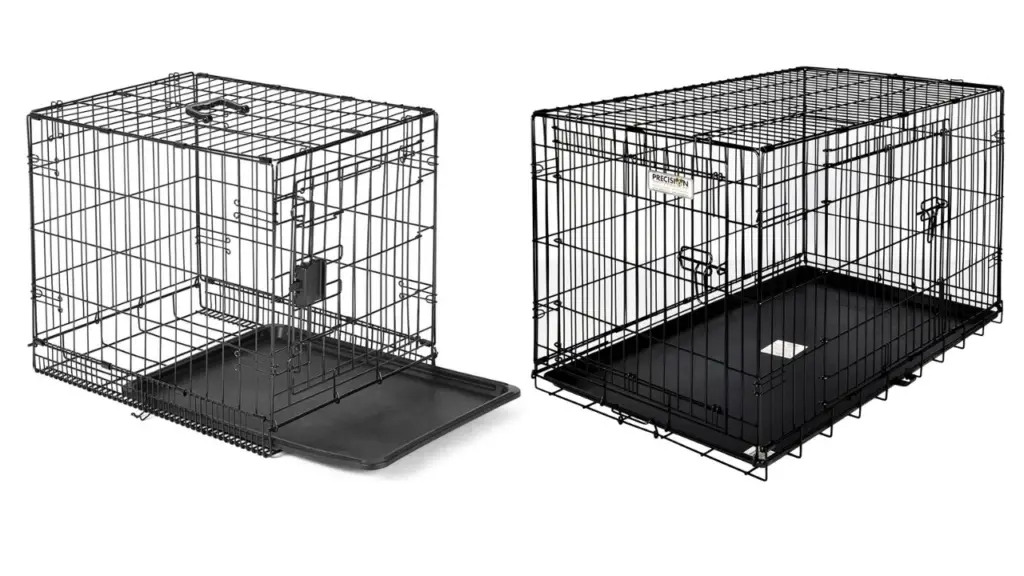
Note: Due to the many gaps a wire crate provides, it may over stimulating for a Poodle’s eyes. Therefore you might want to make the crate more snug by covering the top and sides with a towel or blanket to make it feel like a den.
Mesh
If you plan to travel with your Poodle, then this is one of the best options. It’s extremely lightweight and quick to set up for a journey or stay in a motel. The mesh also serves as excellent ventilation for your dog.
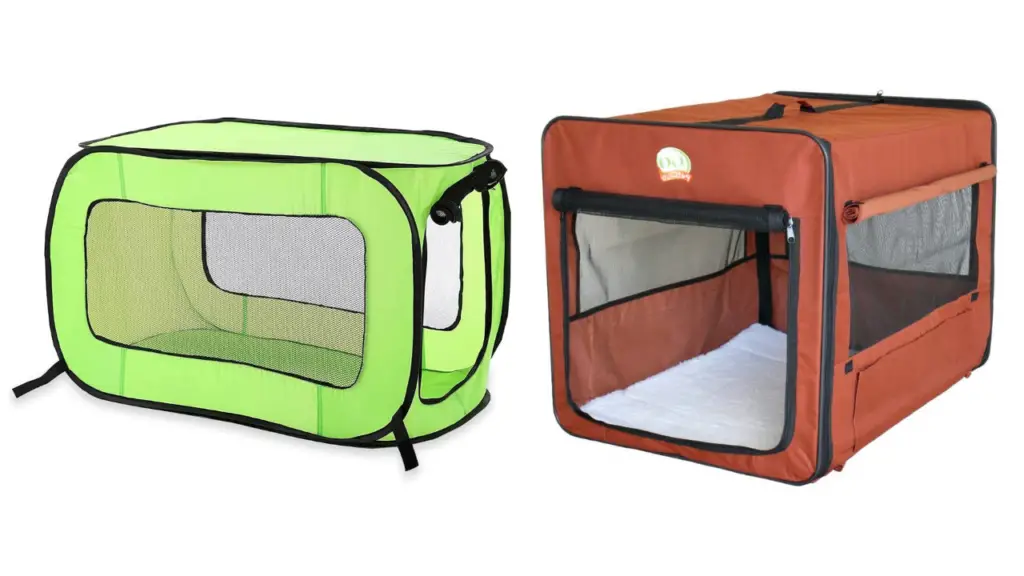
On the contrary, one of the main downsides is that sometimes Poodles like to chew through the mesh, making it difficult for long-term crating as they try to escape. Similarly, as the bottom of the crate is made out of mesh, they don’t have a solid barrier in case your dog has an accident.
Molded plastic
These types of crates provide a lot of warmth for your Poodle as they stop drafts. Therefore, this might be the best option if you live in a cold country. Often molded plastic crates are safer for Poodle puppies as there is a lower risk of them getting caught up in the wire or injuring themselves.
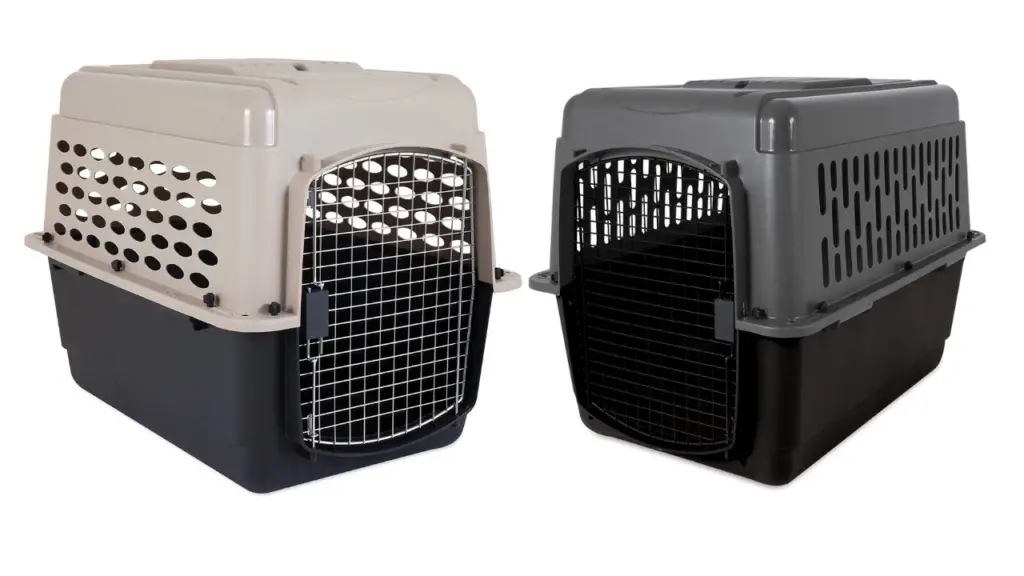
If you plan to fly your Poodle anywhere, airlines only accept plastic or metal crates. On the contrary, if you live in a hot country or plan on crating your puppy in the summer season, you may want to explore other options as they heat up easily.
Note: No matter what type of crate you purchase, it must be big enough for your Poodle to stand up and turn around easily.
Gates
In addition to a crate, you might want to consider installing gates in your home for your Poodle puppy. Gates can act as practical dividers to keep your puppy safe from accidents and stop them from damaging expensive furniture. Gates are not expensive, and baby gates can often do the trick. Alongside this, you can also buy the following:
● Metal: Highly sturdy and less likely to be destroyed by your Poodle.
● Wood: This is more aesthetically pleasing and can easily blend in with your furniture. A wooden gate may encourage your puppy to teeth on it.
● Mesh: This is often the cheapest form of gate to buy but can be destroyed easily by your Poodle.
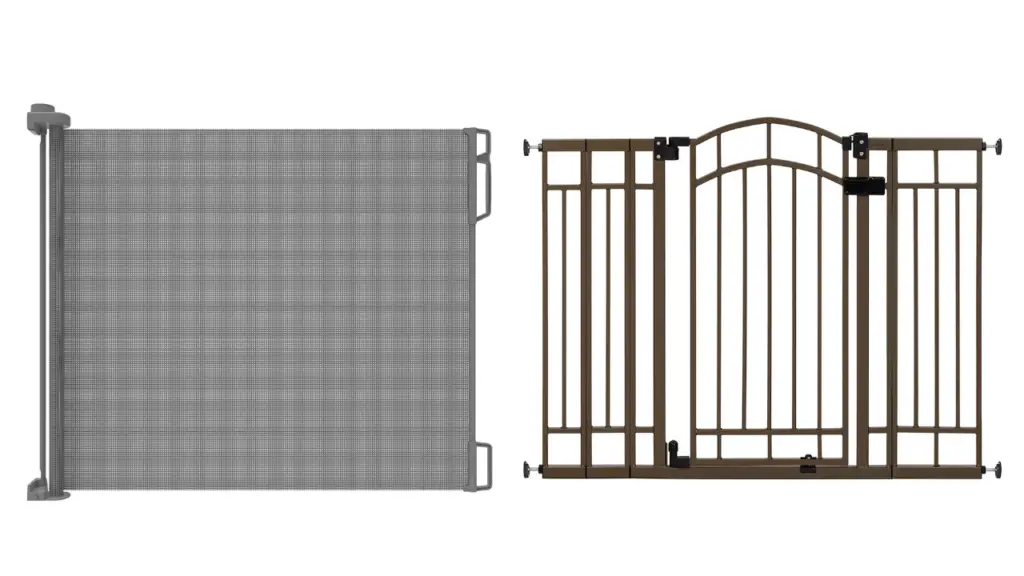
Note: You can easily purchase gates online, in catalogs, or from dog supply stores. A lot of them can easily be installed without tools or attachments. There are also ones that are more permanent, allowing you to open and close them, without stepping over them. Generally, gates can cost between $30 and $130.
What to consider when buying a gate?
Before buying a gate for your Poodle, you’ll want to consider the following:
● Height of the gate: Poodle puppies grow quickly, and if you want to restrict access to certain rooms, you’ll want a gate high enough that your Poodle can’t jump over.
● Material of the gate: Think about the material; you don’t want it to harm your puppy.
● Size of the gaps between the bars: If you opt for a gate with gaps, you’ll want to ensure the gaps are small. The last thing you’ll want is your Poodle getting their head or paw stuck in between; it could cause serious injury, trap, or frighten them.
Bedding
When buying your Poodles crate, you’ll also want to buy bedding. Adding bedding will allow your Poodle to feel secure and comfortable, relax when they’re excited, and encourage better sleep. When looking for a bed, you’ll come across many shapes and sizes ranging from $20 to $100. Ultimately, the bedding you pick can be down to personal preferences, but you should select bedding that considers their comfort.
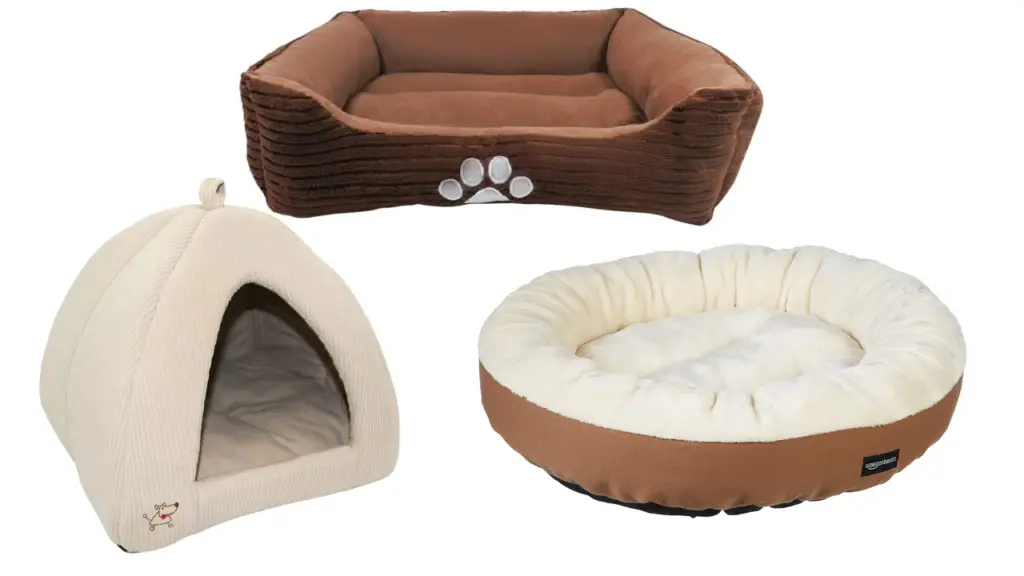
Top Tip: Try not to splurge too much on your Poodle puppy’s first bed. The reason for this is many puppies are prone to a lot of accidents and chewing. Trust me; you don’t want to pay for an expensive bed, and sooner than you realize it’s broken up into chewed pieces. Similarly, a lot of dog beds are padded for insulation, and they pee on them; it may take a long time for the stuffing inside to dry.
So what’s the best type of bedding for a puppy?
To ensure your Poodle stays comfortable, it might be wise to buy a bed with old bath towels and synthetic fleeth. These items can easily be replaced, washed, and dry easily and are inexpensive. If your Poodle is untrained, there is also the option of making a nest of bedding using shredded paper, which they can borrow for warmth, and it stops them from chewing. After your Poodle puppy has been trained, you may want to consider the following:
● Bumper pads: To provide comfort and protection to your Poodle puppy from the sides and wire crates.
● Corner beds: A bed that fits in the corner of your room for space reasons and allows your Poodle to snuggle up.
● Bolster edges: Some beds have bolster edges allowing your dog to snuggle up and prop their head on.
● Removable covers: These allow for easy cleaning protecting the stuffing from getting wet and having to dry for a long time.
Toys
Before bringing your Poodle home, you’ll want to ensure there are a few toys in your home for them to play with and stay entertained. Now when you look to buy them, there’s a lot out there to select from. You can even get creative and make your own toys for them! Regardless of the toy you choose, though, you’ll want to pick them based on the following:
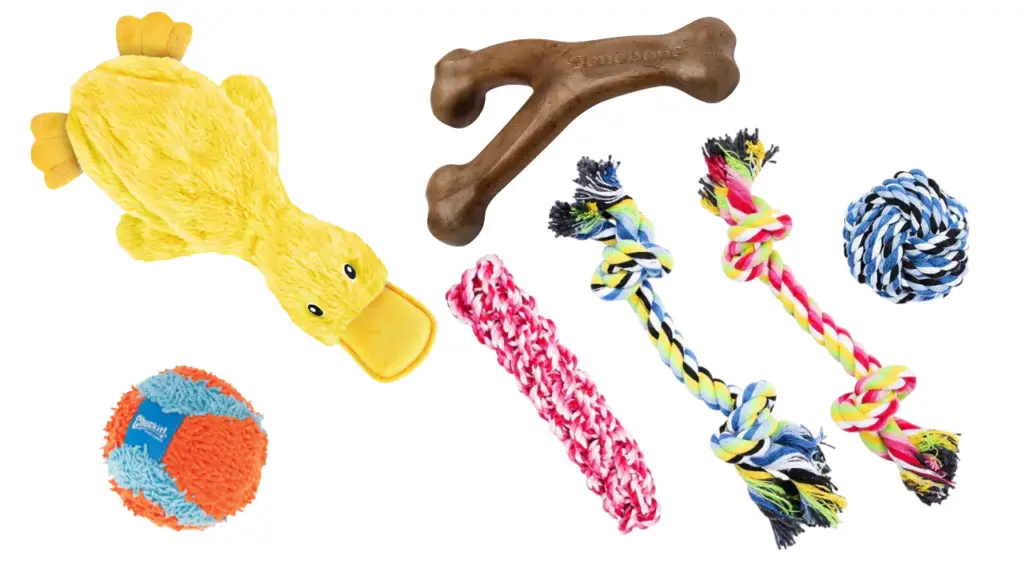
● Size: The size of the toy should be right for your Poodle. You don’t want them too small that they could easily swallow and cause harm. Similarly, if the toy is too big, they may be unable to play or pick it up, proving a waste.
● Poodle’s interaction: You’ll want to carefully observe how your Poodle plays and interacts with the toys. Therefore you might want to first only buy a small few, to see which one they enjoy the most and is the safest.
● Avoid stuffed toys: Poodle puppies can be quite destructive when they’re young, and stuffed toys can be dangerous if they swallow.
What toys can you pick?
Of the many toys on the market, these toys generally never fail for entertainment for a Poodle puppy. These toys are:
Ropes
Thick rope toys double up as both chew toy and are great for a game of tug, being a source of fun entertainment. If you buy rope toys, you’ll want to supervise your Poodle, so they don’t swallow large chunks.
Food stuffed toys
Food stuffed toys are great for rewarding Poodles and also ideal for training. Some of these toys come pre stuffed with food, and others you can add food to your own. There are even toys that dispense food when your Poodle plays with them.
Rawhides
Rawhides are great treats that come from the inner layers of horses, chickens, or cows and made into chewable treats. However, if you plan on giving this to a Poodle puppy, you’ll want to be careful as they may swallow large chunks, posing a risk to their bowels or struggling to digest. Therefore you’ll always want to supervise your Poodle when they’re playing with these.
Retrieving toys
As Poodles were originally bred to be hunting dogs, they have an innate instinct to retrieve items. Because of this, retrieving toys like balls, sticks, and discs are fun to buy. They are perfect for games of fetch and more.
Squeaky toys
Many dogs love squeaky toys as they closely resemble their prey. They can easily become excited and play or chew the toy. Most of these toys are either made out of latex or stuffed. Often latex is a better option as they are easy to chew.
Homemade toys
If you want to save money and be practical, you can make your toys. Just simply find items in your house and turn them into a doy. For instance, you can use your old sock and tie several knots into them. If your Poodle is teething, you could even wet it and freeze it. You could even give them a carrot and see how they gnaw at it.
Top Tip: When buying toys, be careful of buying bones. These bones tend to go into splinters and sharp pieces, which can be dangerous if they swallow. The same applies to rawhide; it can easily turn into mush, making your carpet a mess.
Leash
For training and walking, you’ll want to have a leash on standby for your Poodle puppy. While there are many different types of leashes out there, a nylon leash is often the best bet. Part of this is that it’s the most resistant to chewing if your Poodle decides to chew on it. Alongside this, these leashes are lightweight, making them more comfortable for your puppy and easier to familiarize itself with.

Note: When your Poodle grows bigger, you may wish to get a flexible leash. These leashes help you extend the length when walking or shorten them based on your preference. Also, a harness may be more comfortable for a Toy Poodle for walking.
Collar
Just like other puppy supplies, you must have a collar for your Poodle to help restrain them, train them and keep them safe. When initially buying them a collar, you’ll want to find a basic puppy that’s not too expensive, as it will need to be replaced as they grow.

Puppy collars are lightweight, thinner, and smaller than adult ones making them more comfortable for your Poodle. It is also best if you opt for a collar that has a quick release buckle, allowing you to remove it in the event of anything getting attached. To save you time browsing online, here are three collars I recommend:
Buckle Collar
The buckle collar is a standard collar you can use on a day to day basis. It has an adjustable buckle, which you can change as your puppy grows. Often these collars are made from nylon or leather, and you can easily attach their name tag.
Choke collar
Another option is the choke collar made from highly polished steel, allowing your Poodle to slide through the loop easily. The purpose of this collar is that your Poodle can control the pressure around their neck and it will limit pulling if they become uncomfortable. However, this collar is not suitable for Toys or Miniature Poodles, just for standard. You should only use it for training purposes.
Halter
Once your Poodle is trained, you may wish to consider a halter. A halter is more comfortable than a caller and is great for smaller breeds. The main purpose of this device is to stop the dog from running away.
Note: Your Poodle puppy’s collar should be snug enough so they can’t wriggle and escape from it yet be loose enough, so it’s not too tight and uncomfortable. You should be able to place your finger between the collar and your puppy’s neck.
Food And Water Bowls
You should aim to buy two bowls for your Poodle pup, one to hold water and the other for food. Some of the most popular options are:

● Plastic bowls: These are quite difficult to break and come in several shapes and sizes. The downside of this bowl is that sometimes the plastic can be difficult to clean, and your Poodle pup could develop acne when rubbing their chin on the plastic. They cost between $5-$10.
● Ceramic bowls: Heavy bowls that are difficult to tip over and for food to spill out. Just like plastic bowls, these come in several sizes and shapes. On the contrary, these bowls can easily break. On average, these bowls cost between $5-$25.
Note: If you pick a ceramic bowl, ensure they have a lead-free glaze, as it could poison your Poodle.
● Stainless steel bowl: Often, these bowls are seen as one of the best options as they are easy to clean, can’t be broken, and cannot be chewed. Some have rubber bases, making them difficult to tip over. Stainless steel bowls cost between $2-$15.
Top Tip: Whatever type of bowl you choose for your Poodle, you must wash them after each meal. You should also wash each water bowl every day with soap and water.
Cleaning Supplies
Untill your Poodle puppy is fully housetrained, you’ll want to invest in good cleaning tools. Some of the best supplies to buy are the following:

● Pooper scoopers: Made from metal, they have large handles and scoops at the end, working like a claw to pick their poop up. These tools help with easy cleanup, keeping areas looking clean and nice, saving you the additional burden of cleaning. They cost, on average, $15-$30.
● Plastic sandwich bags: Ideal for picking up poop when you’re walking. On the contrary, if you want to save money, you can recycle grocery or newspaper bags. Pet Stores also provide special dog poop bags.
● Disinfectant: To apply to surfaces to kill different germs your puppy has picked up from outside or their poop. To know the best and safest disinfectant to use around your puppy, speak to your veterinarian.
● Odor neutralizer: Once you’ve cleaned a surface after an accident, you should use an odor neutralizer. These neutralizers contain live bacteria breaking down the lingering smell.
● General cleaning supplies: You’ll want to buy mops, trash bags, mops, and laundry detergent to wash clothes and surfaces.
In conclusion, bringing a new Poodle into your home is a big responsibility that requires preparation and the right supplies. Make sure to take the time to get everything you need to create a safe and comfortable environment for your new pet.
If you have any questions or want to share your own experiences with bringing home a Poodle, I encourage you to leave a comment below.
Marko is the founder and author at PoodleHQ, where he blends profound expertise with formal training in Animal Behavior and Canine Genetics. With multiple generations of poodles under his care, he’s a breed connoisseur, honored with the Canine Care Excellence Award and lauded by the International Pet Enthusiasts Association.


Great article!
Both articles were fantastic!
You’re covering all the bases thanks.